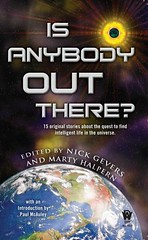If you are new to this blog and are wondering what's up with this
Alien Contact anthology (forthcoming from
Night Shade Books in November) and this "Story #10" -- you may want to begin
here. Or not....
"Kin" by Bruce McAllister
This story was originally published as the cover story in the February 2006 issue of
Asimov's Science Fiction, and is approximately 3,800 words in length. And in only 3,800 words, this story packs one helluva punch. (For those wondering, artist
Dominic Harman did the cover art for that February issue.)
In February 2006, just as "Kin" was seeing print (yes, I know, the February issue would have been distributed much earlier, but allow me some poetic license here, okay?...), I sent a query email to
Bruce McAllister introducing myself, and expressing interest in acquiring a collection of his short stories for Golden Gryphon Press. One of my all-time favorite stories is Bruce's novelette "Dream Baby" (1987), a finalist for both the Hugo and Nebula awards, and, later, expanded into the novel of the same name. There were other stories, too: "The Ark," "Assassin," "The Girl Who Loved Animals," and "Little Boy Blue" in issues of
Omni [I had a subscription at the time]; "Captain China" in Ellen Datlow's anthology
Off Limits; and novelette "Hero, the Movie" in
F&SF; to name just a few. All of these powerful, intelligent, thought-provoking stories. In fact, had I the available word count, I would have included "Hero" in my
Alien Contact anthology as well -- not as a replacement for "Kin," but
in addition to "Kin"!
To make a long story short, the collection did move forward -- but not with the stories that Bruce and his agent (at that time) Russell Galen had originally planned (hey, I had to earn my meager pay as an acquiring editor some how!) -- and The Girl Who Loved Animals and Other Stories was published in October 2007. And with John Picacio cover art, too. "Kin," of course, was included in the collection. And I include it once again in Alien Contact. The story is one that every reader and fan of science fiction needs to read, and I'm doing my best to spread the word.
With less than 3,800 words, an author can't do too much world building, but there is just enough in this story to allow the reader to fill in the blanks, to use one's imagination -- and isn't that what science fiction is really all about? In this world there are the "haves" and the "have nots".... hmm... doesn't sound like science fiction to me, but I digress.... In this world, on this Earth, aliens walk among us. We meet an Antalou, but we learn through him of other worlds, of other wars on those worlds, and this implies, too, that others, besides the Antalou, walk among us. If only....
Bruce wrote a lengthy afterword to "Kin" in The Girl Who Loved Animals and Other Stories, and with his most kind permission I'm including some of those words here [Note: There's a bit of a spoiler here, so you may want to skip this quoted text for now and scroll a bit farther down]:
I'd always been attracted, even as a young writer, to the question of what it would REALLY be like to be a human being in the universe of the Golden Age of Science Fiction, and it was through Harry Harrison's Deathworld trilogy that I first got a glimpse. Harry's trilogy had its heroes, sure, but its heroes also had their human flaws; and common sense and character-as-destiny ran through them and to such a degree that I was surprised that John Campbell had seen fit to publish them in Astounding. But John Campbell was always surprising me.
"Kin" was, then, an attempt to evoke the Golden Age in fable-form but to do it as Harry Harrison had done in his trilogy: show that survival is simply that―human beings reaching into themselves to survive even if what they find that allows them to do so isn't necessarily the most noble traits of human nature. In other words, the boy in this story, though he loved his family, will indeed become an assassin―because it is in him to become one.
In addition to allowing me to excerpt part of his afterword, Bruce has also given me permission to post the contents of "Kin" in its entirety here on More Red Ink. So I'll stop my typing and allow you to read this very fine story, which was a finalist for both the Hugo Award and the Locus Award in the short story category.











